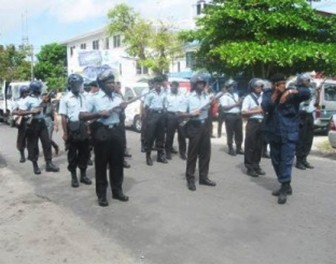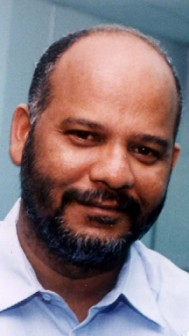The Home Affairs Ministry says it did not instruct the use of rubber bullets against APNU protesters on Tuesday and out of “deep concern” it yesterday called in the police top brass to discuss the issue.
A statement from the ministry said that Home Affairs Minister Clement Rohee met with Commissioner of Police, Henry Greene; Assistant Commissioner George Vyphuis, Commander “A” Division; Snr Supt Linden Alves 2nd 1/C “A” Division; Superintendent Errol Watts 3rd 1/C “A”, Division; Supt Clifton Hicken – O/C TSU; Asst Supt Patrick Todd, Unit Commander to begin investigations into the circumstances surrounding the firing of rubber bullets at APNU protestors.
Several persons including elderly women and a child were injured, sparking outrage and condemnation by sections of society. Critics have said that there were other options available to the police.
Rohee voiced surprise that a Junior Rank could have the authority to make such an important decision as firing rubber bullets and expressed the view that such a determination ought to be made at a higher level. The Minister was advised that according to the Standard Operating Procedure (SOP) this is indeed the case. “However, he was informed that in light of the circumstances on the ground at the time, it was the Unit Commander who took the decision himself (to fire the rubber bullets) without consulting the Divisional Commander or the Commissioner of Police.”

The Minister conveyed his concern about this “serious lapse” and urged the Police Commissioner to put steps in place for “other best practices in respect of crowd control, the necessary corrective administrative and command control measures to avoid a repetition of the unfortunate turn of events” on Tuesday.
Rohee also flayed the police over the shooting of protesters in the back.
“The Minister informed the Senior Police Ranks that shooting at the back of some protestors is inexplicable and unacceptable this was another manifestation of bad judgement by the Ranks on the ground and must never be repeated they were told”, the ministry’s statement said.
Several of the protesters, including attorney James Bond had wounds to the back. He had related how he and former GDF Brigadier Edward Collins had turned their backs to the policemen to shield women in the protest.
Appeal

The Minister said he had also received detailed oral reports from all the players in the Force who were involved in monitoring the protest march up to the shooting of the rubber bullets and the detention of some of the protestors.
He said that from the reports received it was clear that there was some “mis-understanding on the part of the organisers of the march whether permission was granted or not granted for a march to take place.” However, he said that this mis-understanding, according to the Police was clarified by Senior Ranks on the ground who advised the organisers that permission was not granted and therefore the need to postpone the protest march and make a fresh application. He said this was agreed but eventually reversed by the organisers themselves who then proceeded with the march
The Ministry said that it has never been the intention of the government to stop any organization from protesting but the law must be observed. It cited Section 5(1) Cap 16:03 of the Public Order Act of Guyana which deals with this issue.
The Ministry noted that where there is a refusal by the police to grant permission for a march, an appeal could be made to the ministry.
“The Ministry of Home Affairs wishes to state that had an appeal been received from the Organisers of the march the unfortunate turn of events would have been avoided”, the statement said.
Tear gas
The statement also reiterated the position of the police that no tear gas was fired at protesters. Children from St Sidwell’s Primary had been affected by an acrid odour during the police operation in the area and covered their noses and mouth in panic.
“The Minister was assured by the Police that at no time was tear gas used against the protestors. It was agreed that had this been the case, just as media operatives were able to find and show on TV spent cartridges of the rubber bullets in the same way empty tear smoke canisters would have been found and shown on TV.
“The meeting agreed that this was clear mischief on the part of some media houses who mistook the scent from the discharge of the rubber bullets for tear smoke but did not have the decency to withdraw this blatant media concoction to allay fears and anxieties of the general public”.
The headmistress of the school, Donna Morgan had told reporters on Tuesday that the pupils were affected by tear gas.
Rohee told the senior officers at yesterday’s meeting that he was of the view that there is a need to put in place creative measures particularly in respect of public protest marches/processions. He said these could include publishing notices in the daily newspapers and TV giving the name of the organisers, the date, time and route of the procession; publishing in the daily newspapers and TV the Laws of Guyana as regards public processions. He also suggested having meetings on the day before the procession between the Divisional Commander and Organisers to review the arrangements.
“The Ministry wishes to make it clear from the outset that it has always sought to restrain itself from interfering and or meddling in operational matters executed by the Guyana Police Force. The Ministry has always done its level best to restrict itself to policy, programmatic and budgetary issues in respect to its role vis-à-vis the Guyana Police Force.
“This role, notwithstanding, the Senior Police Ranks present at the meeting were advised by the Minister that while operational matters undoubtedly fall within the purview of the Guyana Police Force, once badly executed due to poor judgement by Ranks on the ground they can have serious political repercussions as was demonstrated by the events on December 6, 2011″, the ministry statement added.
On November 30, two days after the elections, then President Bharrat Jagdeo had announced that the security forces were fully mobilised and on alert in the city to prevent any violence. He also sounded a warning against attempts to mislead people into taking to the streets over the elections results.
“The security forces have my clear instructions to deal with any act of violence against any citizens in the manner befitting those actions and also in accordance with the laws of this country,” he told a hastily-convened news conference at State House.
“I have made it clear that what we trained for, that is, any eventuality—for people to come on the street and harm others—that we will proceed according to plan to make sure that the environment is safe and that people can go about their business in a safe manner without being subjected to harassment and violence,” Jagdeo added. He said he had instructed the Police Commissioner to ensure the protection of citizens in the city, in addition to requesting that an investigation be done into all attempts to incite violence and that every instance be documented.




